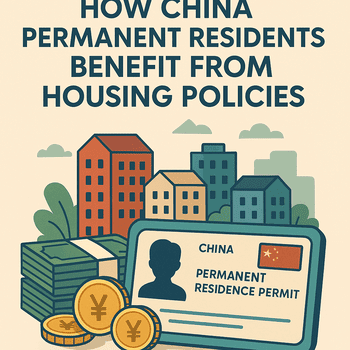
Securing permanent residency in China offers significant advantages over other visa categories, particularly regarding property ownership.
However, the reality is more nuanced than often portrayed.
This comprehensive guide examines the actual benefits, limitations, and regional variations permanent residents face in China’s complex real estate market as of 2025.
1. Property Ownership Rights: Regional Variations Matter
While permanent residents enjoy greater flexibility than other foreigners, property rights vary significantly by location and are not equivalent to those of Chinese citizens.
| City/Region | Purchase Restrictions | Down Payment Requirements | Notable Policies |
|---|---|---|---|
| Beijing | Limited to 1 property; 5 consecutive years of tax payments | 70% minimum | Additional approval from local housing bureau required |
| Shanghai | Limited to 1 property; 3+ years of social insurance | 50-70% depending on property type | Free Trade Zone offers more flexibility |
| Guangzhou | Limited to 2 properties with 2+ years of tax payments | 40-60% | Greater Bay Area initiative provides some exemptions |
| Shenzhen | Limited to 1 property; 3+ years of tax payments | 50-70% | High-tech talent may receive special considerations |
| Second-tier cities | Generally fewer restrictions | 30-50% | Some offer incentives to attract foreign talent |
| Free Trade Zones | Relaxed restrictions in designated areas | Varies by zone | Special policies to attract foreign investment |
Source: Housing and Accommodation for Permanent Residents in China
2. Mortgage Financing: Not as Favorable as Often Claimed
Contrary to popular belief, permanent residents face significantly different financing terms compared to Chinese citizens:
| Financing Aspect | Terms for Permanent Residents | Terms for Chinese Citizens |
|---|---|---|
| Maximum Loan Term | Typically 10-20 years | Up to 30 years |
| Interest Rates | 0.5-1% higher than base rate | Standard base rate |
| Down Payment (First Home) | 50-70% depending on city | 20-30% |
| Down Payment (Second Home) | 70-100% where permitted | 40-70% |
| Required Documentation | Income verification for 2+ years, tax payment records | Less stringent verification |
According to a 2025 report by the China Banking Association, only about 30% of Permanent Residents successfully obtain mortgage financing, compared to 65% of Chinese citizens.
Source: Industrial and Commercial Bank of China, 2025
3. Multiple Property Ownership: Possible but Restricted
While permanent residents can technically own multiple properties, this is subject to strict local regulations:
- In most first-tier cities, permanent residents are limited to one property
- A second property may be permitted specifically for children’s education with proper documentation
- Each additional property typically requires higher down payments (70-100%)
As stated by AnyVisa: “Foreigners with Permanent Residence can break through the ‘one residential property’ restriction. If it is for children’s education, a second house can be purchased after providing a school district enrollment certificate.”
Source: A Comprehensive Guide for Foreigners on Home Purchase Policies
4. Impact of the Hukou System on Permanent Residents
The hukou (household registration) system continues to affect housing rights even for permanent residents:
| Aspect | Impact on Permanent Residents |
|---|---|
| School District Housing | May purchase but children might not have automatic access to district schools |
| Access to Subsidized Housing | Generally ineligible regardless of property ownership |
| Community Services | Access varies by district and local regulations |
| Property Tax Considerations | May face different tax rates in some municipalities |
Source: China Population and Development Research Center, 2025
5. Government Subsidies: Limited Availability
Despite claims to the contrary, permanent residents have limited access to government housing subsidies:
- Most housing subsidies are tied to the hukou system
- Tax reductions on property purchases are rarely available to permanent residents
- Financial assistance programs typically require Chinese citizenship
6. Recent Policy Developments (2024-2025)
Several recent developments affect permanent residents’ housing options:
- Free Trade Zone Expansions: Shanghai, Hainan, and Guangdong FTZs have introduced more flexible property policies
- Digital Property Registration: The new nationwide digital property registration system launched in late 2024 has streamlined documentation
- Greater Bay Area Initiative: Special housing policies for high-skilled permanent residents in the Guangdong-Hong Kong-Macau region
- Rental Market Regulations: New protections for long-term renters benefit permanent residents who choose not to purchase
Source: State Administration for Market Regulation, 2025
7. Documentation Requirements for Property Purchase
Permanent residents must prepare extensive documentation:
| Required Document | Purpose | Where to Obtain |
|---|---|---|
| Permanent Residence Card | Primary identification | National Immigration Administration |
| Tax Payment Records | Proof of financial stability | Local Tax Bureau |
| Income Verification | Loan qualification | Employer or accountant |
| Housing Purchase Qualification Certificate | Permission to purchase | Local Housing Bureau |
| Notarized Marriage Certificate (if applicable) | Joint ownership documentation | Home country embassy + Chinese notarization |
Source: Housing and Accommodation for Permanent Residents in China
8. Property Management Challenges
According to a 2025 survey by the China Real Estate Association, 62% of permanent residents report challenges with property management communication, compared to 23% of Chinese citizens. Common issues include:
- Language barriers with neighborhood committees (居委会)
- Difficulty setting up utilities (often requiring a Chinese citizen as guarantor)
- Limited access to property management services in English
9. Practical Tips for Permanent Residents
- Work with agencies specializing in foreign clients (e.g., Lianjia International, Savills China)
- Utilize dedicated platforms like Juwai.com that cater to foreign buyers
- Engage a bilingual real estate attorney for contract review
- Verify property ownership records through the official real estate registry
- Understand property tax obligations, which vary by city and property type
Conclusion
While China’s permanent residence status does offer significant advantages over other visa categories in the property market, the benefits are not as extensive as often portrayed.
Permanent residents still face considerable restrictions, higher financial barriers, and regional variations in policy implementation.
Understanding these nuances is essential for making informed housing decisions in China’s complex real estate landscape.


